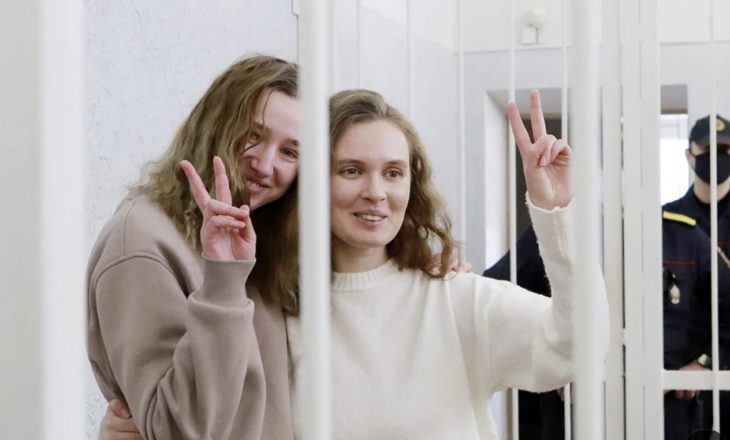Belarusian journalists sentenced to two years in prison for live streaming a protest rally in Minsk

On Thursday, February 18, a Minsk court sentenced journalists Darya Chultsova and Katsyaryna Andreyeva from the independent television channel Belsat to two years in prison. They were found guilty of organizing protests, despite the fact that they were only running a live stream of the rally in question. Journalists from countries around the world have spoken out in support of these two women and human rights defenders have declared them political prisoners. Meduza recounts how the criminal case against Darya Chultsova and Katsyaryna Andreyeva came about and how their trial ended.
Against the backdrop of protests in the lead up to the 2020 presidential elections last summer, the Belarusian authorities carried out an escalating crackdown on independent media. In June, Interior Minister Yury Karayeu (who was removed from office just months later) directly accused journalists of organizing demonstrations — allegedly, reporters were using live streams to coordinate the protests. Belarusian President Alexander Lukashenko (Alyaksandr Lukashenka) backed up Karayeu’s claims — and also demandedthat journalists working for foreign outlets be expelled from the country.
The Belarusian authorities didn’t stop there. Since the start of the protests in Belarus journalists have been detained approximately 450 times; many of them were held in custody and beaten up by police (including Meduza’s own special correspondent, Maxim Solopov). According to the Belarusian Association of Journalists (BAJ), nine reporters are facing criminal charges.
On February 9, one of the most high-profile cases against Belarusian journalists went to trial — correspondent Katsyaryna Andreyeva and camera operator Darya Chultsova from Belsat TV had their first of four sessions in court. These two journalists specialize in reporting and live streaming, and were covering protest rallies.
Katsyaryna Andreyeva is 27 years old — in the past, she collaborated with Radio Svoboda, and was published in the independent Russian newspaper Novaya Gazeta. She started working for Belsat TV in the spring of 2017.
Daria Chultsova is four years younger — just 23 years old. She graduated from the Faculty of History and Philology at Mogilev University and worked as a reporter before becoming a camera operator. After the August 2020 presidential election in Belarus, she moved to Minsk.
On Thursday, February 18, judge Natallya Buhuk found the two young women guilty of “organizing mass events that grossly violate public order” and sentenced each of them to two years in prison.
A hunt for journalists
Andreyeva and Chultsova were arrested on November 15, 2020. On that day, a memorial rally was taking place in the Belarusian capital in honor of Raman Bandarenka — an opposition protester killed in Minsk. People gathered near Bandarenka’s home, in the courtyard of a residential complex known as “Changes Square.” The authorities had shut down mobile Internet completely in Minsk that day, so the owners of an apartment in a high-rise overlooking the rally’s location allowed Andreyeva and Chultsova to broadcast a live stream from their home.
Towards evening, the security forces violently dispersed the rally, arresting many of its participants. Armed special forces officers broke down the door of the apartment that the journalists were working from and accused them of taking part in the protests and disobeying security officers — both Andreyeva and Chultsova were sentenced to seven days in administrative detention.
“Every time Katya [Katsyaryna Andreyeva] went to such a rally she was aware that she might not return home. Effectively, after the 2020 elections, a real hunt for journalists was declared. Every time she left with a backpack containing all the necessities in case of arrest,” Andreyeva’s husband Ihar (Igor) Ilyash told Meduza.
Their four-person cell held a total of 11 people. The detainees weren’t given blankets or sheets and were forced to sleep on old mattresses.
A criminal case was opened against Andreyeva and Chultsova while they were still serving time in administrative detention — even though the court’s ruling on the administrative charges noted that there was no evidence of a crime in their actions. Andreyeva and Chultsova stood accused of “organizing and preparing actions that grossly violate public order.” State investigators claimed that the journalists had used the live streat to “gather the protesters” on “Changes Square,” which, in turn, disrupted public transit. The damage to “Minsktrans” was estimated at 11,526 Belarusian rubles (about $4,440).
The two women were transferred to a prison in Zhodino (a city located 50 kilometers, or 30 miles, from Minsk), which held many of the protesters arrested during the opposition demonstrations. Katsyaryna Andreyeva and Darya Chultsova pleaded not guilty to the charges. Belarusian human rights activists declared them political prisoners. The Belarusian Association of Journalists spoke out in their defense, as did the European Federation of Journalists. A number of Russian public figures also made personal appeals to Alexander Lukashenko demanding their release.
On January 20, 2021, Ihar Ilyash published an open letter to the investigators handling the case against Katsyaryna Andreyeva and Darya Chultsova. “You’re slipping into complete absurdity — you’re [looking] Katsyaryna’s relatives in the eyes and saying that she supposedly isn’t a journalist, that she wasn’t fulfilling any professional duties on ‘Changes Square.’ Not only is this a blatant lie, but it also makes no sense: it’s as if a non-journalist can be illegally imprisoned,” he wrote.
Despite being arrested and charged, the two girls remained optimistic, their family members said. According to Ilyash, Katsyaryna often emphasized in her letters that she didn’t regret anything. Darya Chultsova’s mother Natallya also noted that her daughter never doubted her decision to become a journalist.
“In her letters, everything was in a fighting [spirit]…She spoke to me like this: ‘I want you to be proud of me.’ I’m very proud of her, though sometimes I’m tormented by the fact that she ended up in there…I just love her and want her to be okay. She’s our warrior. Dasha is a winner,” Natallya said in an interview.
‘My case is fabricated from beginning to end’
In total, there were four sessions in the trial of Katsyaryna Andreyeva and Darya Chultsova. The first took place on February 9 and the last on the morning of February 18.
Before the trial began Katsyaryna Andreyeva made an appeal. “My case is fabricated from beginning to end, and fabricated very ineptly. I consider this the revenge of the special forces for professional journalistic activity. On November 15, I was detained on a criminal order. On that day, the security forces told me: ‘You won’t conduct your live streams ever again!’ Then another criminal order was issued and they put me in jail,” said her statement, as read out by her husband Ihar Ilyash during a special press conference.
According to Ilyash, the process itself was very strange. For example, only journalists from state media were allowed to attend the hearings. Ilyash is convinced that this was intended to draw international attention away from the trial, because it was covered by Le Monde, BBC, Deutsche Welle, and many other international outlets.
Ilyash himself, who was also detained amid the protests and then placed in administrative detention, appeared in court as a witness. “They asked me about some details that had nothing to do with Katsyaryna and Darya. For example, do I have a marriage contract, what my salary is, and so on,” he told Meduza.
In total seven witnesses were questioned in court. According to the defense, they weren’t able to say anything specific about the defendants’ alleged guilty. For example, when they questioned Nikolai Skorin, a pensioner who lives on “Changes Square,” he said that on November 15 he stood at his window for three hours and saw that the number 18 bus had stopped running. He also noticed a car in the courtyard which, in his opinion, could have “coordinated the protesters” and reported it to the police. That said, he didn’t see any journalists.
The owners of the apartment where the journalists ran their live stream also spoke in court — they emphasized that they didn’t hear any calls to participate in the rally from them. A “Minsktrans” employee by the name of Raman Pranovich was also called to the stand — he said that the disruptions to public transport were caused by protesters who blocked the road. The journalists’ relatives paid compensation to Minsktrans for the damages, after which the enterprise withdrew a separate claim against Andreyeva and Chultsova.
The defense argued that the court hadn’t investigated what exactly had stopped the buses from running — perhaps it was the actions of the security forces, who themselves blocked roads in order to detain protesters.
In addition, according to Ihar Ilyash, during the trial it became known that the investigators and the prosecutor’s office didn’t take issue with the entire multi-hour-long live stream, but rather with 12 short clips from the broadcast, in which Katsyaryna Andreyeva describes the actions of the protester and the security forces. The four specialists who provided linguistics analysis for the case agreed that the report didn’t contain any “signs of organizing” or inciting the actions of the protesters.
In conversation with Meduza, Katsyaryna Andreyeva’s lawyer Syarhei Zikratsky also underscored that the prosecution didn’t provide any evidence that a crime was committed at all. In turn, Darya Chultsova’s lawyer Alyaksandr Khayetsky noted that investigators obtained many of the case materials in violation of the criminal procedure code. For example, they conducted searches of the journalists’ apartments without the necessary authorization.
In addition, Khaetsky pointed out that because mobile Internet was turned off in Minsk on November 15, it wasn’t even theoretically possible to use the live stream to direct the protesters’ actions.
Regardless, state prosecutor Alina Kasyanchyk reached the conclusion that the journalists’ had been proven guilty and asked the judge to sentence them to two years in prison.
“I haven’t committed any illegal actions. All of the materials point to my innocence. I hope for an honest and fair acquittal,” said Darya Chultsova in her final statement in court.
Katsyaryna Andreyeva spoke in detail about the working conditions for journalists in Belarus: “Each time I went to work I risked my health and my life. Nevertheless, I went to the epicenter of the events. I managed to hide from shooting with rubber bullets, explosions from stun grenades, and blows from truncheons. My colleagues were much less fortunate…on November 15 people came out to ‘Changes Square.’ I showed these events on a live broadcast. For this I was thrown in jail on a made-up charge.”
On February 18, the judge sided with the state prosecutor and sentenced each of the journalists to two years in prison. Lawyer Syarhei Zikratksy told Meduza that the defendants took the verdict calmly and are now planning to make an appeal.
Numerous journalists and politicians have already expressed their support for Katsyaryna Andreyeva and Darya Chultsova. Polish President Andrzej Duda demanded their release and called on the entire European Union to show solidarity and “to respond consistently and decisively to the ongoing suppression of fundamental rights and freedoms” in Belarus.
In conversation with Meduza, Ihar Ilyash told Meduza that Katsyaryna Andreyeva was prepared for any outcome: “We will survive all of these special services and prisons anyway. Our love is stronger than Lukashenko’s regime and certainly more durable than it.” Darya Chultsova’s sister Anastasia said that she was prepared for the worst, but still hoped for a fair trial.
“Katya and Dasha’s sentence isn’t just repression. It’s an act of terrorism aimed at intimidating the journalistic community. Let’s call it like it is: a war is being waged against us. They [the authorities] have declared war on us, because they’re terribly afraid of the truth, they’re afraid of facts. This means we should have a single response: even more truth and even more facts,” Ilyash underscored after the verdict.
Story by Alexey Shumkin
Translation by Eilish Hart




